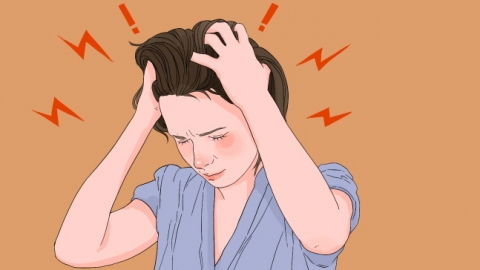I'm experiencing severe headaches during my menstrual period. What could be causing this, and what should I do?
Generally, "coming of age" refers to the menstrual period. Headaches during menstruation may be caused by lack of sleep and stress, hormonal changes, infections, anemia, hypertension, and other factors. Treatment options include general treatment, physical therapy, and medication, which should be used under a doctor's guidance. If discomfort occurs, it is recommended to seek medical attention immediately. Detailed analysis is as follows:

1. Lack of Sleep and Stress
During menstruation, some women may experience sleep disturbances due to concerns about leakage, dysmenorrhea, or emotional fluctuations. Prolonged熬夜 and inadequate rest can lead to physical fatigue, subsequently causing headaches. Additionally, psychological stress and anxiety during menstruation might exacerbate headache symptoms. Therefore, it is recommended to maintain good sleep habits and a positive mindset to alleviate menstrual headaches. Learning to relax through activities like listening to music or reading can also help relieve stress and anxiety.
2. Hormonal Changes
During menstruation, estrogen levels in women fluctuate. Estrogen has a vasodilatory effect, and when its levels drop, it may cause vasoconstriction, affecting blood supply to the brain and triggering headaches. Women are advised to engage in moderate exercise during this time, such as walking or yoga, which can help improve circulation and reduce stress.
3. Infection
During menstruation, women's physical resistance and immunity may decrease, increasing the risk of infections. For example, urinary tract infections are relatively common during menstruation and may be accompanied by symptoms such as fever, cough, and headaches. If headaches occur alongside other symptoms, prompt medical examination is recommended to determine if an infection is present. To prevent infections, women should maintain good personal hygiene, keep the vulva clean, and change underwear and sanitary pads frequently. Avoid using highly irritating sanitary products to reduce irritation to the skin of the external genital area.
4. Anemia
Anemia may result from reduced hematopoietic materials, such as deficiencies in iron, folic acid, and vitamin B12, or excessive red blood cell destruction. During menstruation, anemic patients may experience exacerbated symptoms due to excessive blood loss, leading to decreased oxygen-carrying capacity of the blood, cerebral hypoxia, and resulting in headaches. It is often accompanied by symptoms such as fatigue and weakness. Treatment options include medications like Fufang Ejiao Jiang (Compound Ejiao Syrup), vitamin C tablets, and folic acid tablets, which should be used according to medical advice.
5. Hypertension
Genetic factors and unhealthy lifestyles may lead to hypertension. During menstruation, hormonal changes in the body may further elevate blood pressure, causing headaches. These headaches are typically associated with cerebral vasoconstriction or dilation caused by hypertension or increased intracranial pressure resulting from hypertension. Symptoms may include dizziness and chest tightness. Medications such as amlodipine besylate tablets, losartan potassium tablets, and metoprolol tartrate tablets can be used under a doctor's guidance for treatment.
Women should adjust their schedules, maintain a positive mindset, keep warm, avoid prolonged use of electronic devices, and maintain healthy lifestyle habits during menstruation.






